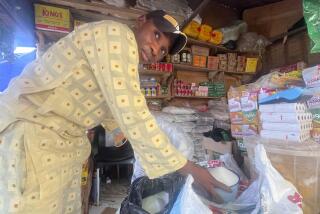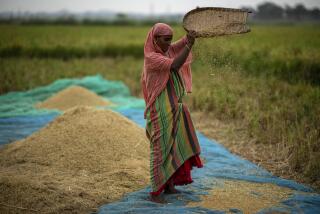Coffee Futures Soar as Frost Returns to Brazil
- Share via
RIO DE JANEIRO — Coffee prices soared on commodity markets Monday--promising another round of retail price hikes--after a weekend freeze destroyed more crops in Brazil’s most important coffee-growing region.
Brazil, the world’s largest coffee producer, is already reeling from a June frost that destroyed 30% of next year’s crop, and it was scrambling to assess and mitigate the damage from the latest catastrophe.
Meanwhile, the most active coffee futures contract on the London Commodity Exchange rose as much as $924 a ton, or 30%, to $4,000 a ton--the highest price since February, 1986. This is the largest gain in one day since the dollar-based contract began trading in March, 1991.
The price of a pound of raw, green coffee on New York’s Coffee, Sugar and Cocoa Exchange shot up Monday morning to $2.395 a pound, an eight-year high, and ended the day 47 cents higher at $2.353. The price has risen 87% since the first damaging frost June 25.
Coffee drinkers had already started to feel the pinch of higher prices from the June freeze and from tight supply. General Foods, Procter & Gamble and Nestle Beverage, which together have 70% of the U.S. retail coffee market, have raised their prices as much as 17%.
Eric Nadelberg, vice president with Merril Lynch Futures in New York, said the impact of the second frost will probably be reflected in consumer prices within two weeks.
“My advice,” said broker Robert Griffith, owner of Capricorn Coffee in Brazil, “is to go out and buy a cup of coffee during your lunch break . . . because it’s going to go up.”
Coffee growers and market analysts said the latest freeze, just two weeks after the first harsh frost, was more devastating because it struck plantations in the heart of Minas Gerias, the southern state of Brazil that is the world’s No. 1 coffee-producing region.
“The last frost, they had very heavy damage in Sao Paulo and Parana, but we were mostly not affected,” said Marcello Vieira, a Minas Gerias plantation owner who is president of the Specialty Coffee Assn. of Brazil. “But yesterday, the loss is much heavier. We are making the first calculations now, and we estimate that 30% of the crop has been lost.”
David Bagley, a coffee trader from Machado & Co. in New York, was surveying the damage Monday on plantations in southern Minas Gerias.
“We’re going to have to wait a few days to see exactly the extent of the damage, but it could mean a loss of as much as 10 (million) to 13 million bags of coffee production,” he said. Brazil had been expected to harvest about 30 million bags of coffee for next year.
Inside Brazil, the government is trying to hold down coffee prices locally and increase the amount of coffee available for export by auctioning much of an estimated 17 million bags it has in stock to local roasters at below-market prices. Earlier this month, it agreed to increase the amount for auction to 7.4 million bags, from 2.4 million.
The government agreed to allow 500,000 bags of coffee to be auctioned monthly between August and May. Last month, the bags fetched between $120 and $160 each.
More to Read
Sign up for Essential California
The most important California stories and recommendations in your inbox every morning.
You may occasionally receive promotional content from the Los Angeles Times.













